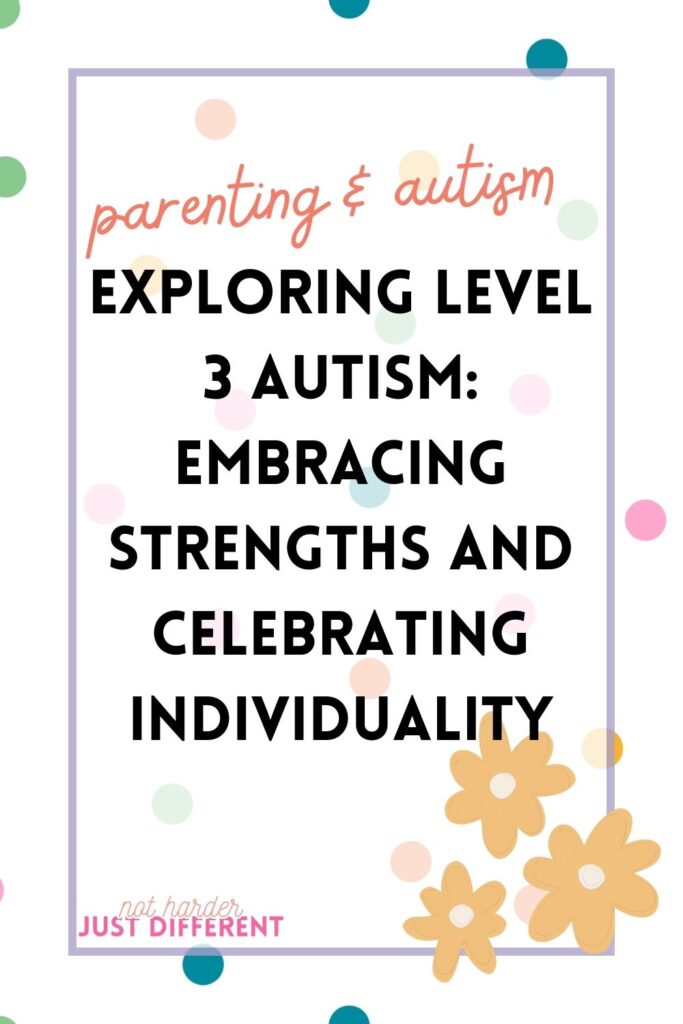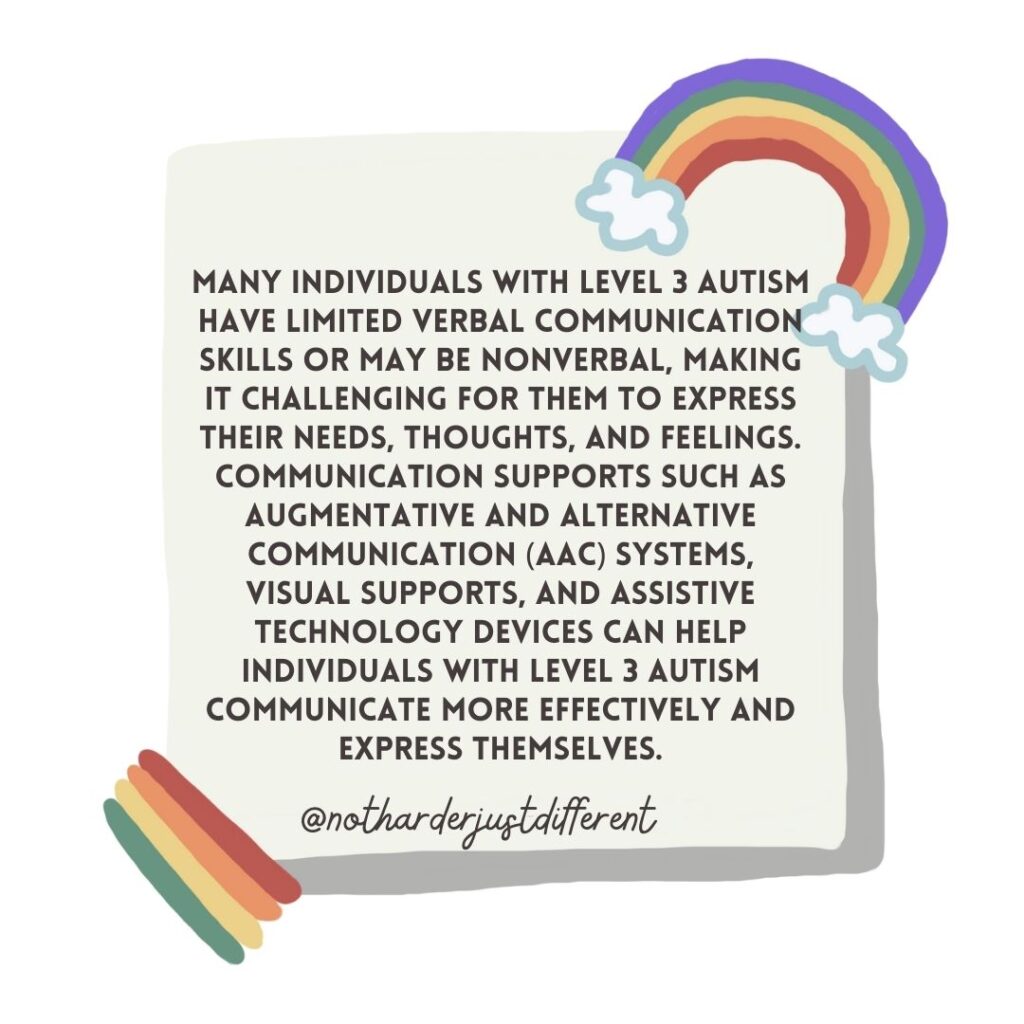Disclaimer: As a future Licensed Clinical Social Worker (LCSW) currently pursuing my master’s degree, I am passionate about sharing insights and information related to parenting, autism and homeschooling based on my personal experiences and research. However, the content shared on this blog is not intended to substitute professional advice, diagnosis, or treatment. Parenting is a deeply personal journey, and while I strive to provide valuable insights, every family and situation is unique. Readers are encouraged to consult with qualified professionals for personalized guidance tailored to their specific needs and circumstances.
Level 3 autism is part of the autism spectrum, and it’s all about recognizing and celebrating the amazing strengths and talents of individuals who are on this part of the spectrum.
Table of Contents
First things first, let’s talk about what Level 3 autism actually means. It’s a term used to describe individuals who have autism spectrum disorder (ASD) and require very substantial support in their daily lives. But here’s the thing – just because they need more support doesn’t mean they’re lacking in strengths and abilities! In fact, individuals with Level 3 autism often have incredible talents and unique qualities that make them truly remarkable.
Now, let’s dive into this topic with a strengths-based approach. Instead of focusing solely on the challenges that individuals with Level 3 autism may face, we’re all about highlighting their amazing strengths and celebrating their individuality. Because every person, regardless of their neurotype, has strengths and talents that deserve to be recognized and celebrated. So, are you ready to join me in celebrating the incredible journey of individuals with Level 3 autism? Let’s do this!

Understanding Level 3 Autism
Level 3 autism, also known as “severe” autism, is a term used to describe individuals who have autism spectrum disorder (ASD) and require very substantial support in their daily lives. It’s important to understand that autism is a spectrum disorder, meaning that it encompasses a wide range of abilities, challenges, and characteristics.
Individuals with Level 3 autism typically exhibit significant impairments in social communication, language development, and behavior. They may have limited verbal communication skills or be nonverbal, relying on alternative forms of communication such as gestures, picture communication systems, or assistive technology devices. Additionally, individuals with Level 3 autism may display repetitive behaviors, restricted interests, and difficulty adapting to changes in routine or environment.
One key aspect of Level 3 autism is the level of support and intervention needed to help individuals navigate their daily lives. They may require assistance with activities of daily living, personal care tasks, and communication. Additionally, individuals with Level 3 autism may benefit from specialized educational programs, intensive therapy interventions, and ongoing support services to address their unique needs and promote their overall well-being.
It’s important to recognize that individuals with Level 3 autism are unique individuals with their own strengths, preferences, and personalities. While they may face significant challenges, they also possess many strengths and talents that deserve to be celebrated and nurtured. By understanding and acknowledging the diversity within Level 3 autism, we can better support and advocate for individuals on the spectrum, helping them lead fulfilling lives and reach their full potential.
Common Strengths of Individuals with Level 3 Autism
Despite the challenges they may face, individuals with Level 3 autism possess many strengths and unique qualities that are worth celebrating. Here are some common strengths often seen in individuals with Level 3 autism:
- Visual Thinking and Memory: Many individuals with Level 3 autism have a strong ability to think visually and may excel in tasks that require visual-spatial reasoning. They may have an excellent memory for visual details and patterns, which can be advantageous in various domains such as art, mathematics, and problem-solving.
- Sensory Sensitivity: While sensory sensitivities can present challenges for individuals with Level 3 autism, they may also have a heightened awareness of their environment and sensory stimuli. This heightened sensitivity can allow them to notice subtle changes and details that others may overlook, contributing to their unique perspective on the world.
- Attention to Detail: Individuals with Level 3 autism often exhibit a remarkable attention to detail and may excel in tasks that require precision and accuracy. They may have a keen eye for spotting patterns, inconsistencies, and nuances in their surroundings, which can be valuable in fields such as engineering, computer programming, and scientific research.
- Persistence and Determination: Many individuals with Level 3 autism demonstrate remarkable persistence and determination when pursuing their goals and interests. They may exhibit a strong work ethic and a willingness to persevere in the face of challenges, which can lead to significant achievements and accomplishments in their chosen endeavors.
- Creativity and Imagination: Despite difficulties in social communication and interaction, individuals with Level 3 autism often possess rich inner worlds and vivid imaginations. They may express themselves creatively through art, music, storytelling, or imaginative play, showcasing their unique talents and perspectives.
By recognizing and celebrating these common strengths of individuals with Level 3 autism, we can empower them to harness their abilities, pursue their passions, and lead fulfilling lives. Embracing a strengths-based approach allows us to appreciate the diversity and unique talents of individuals on the autism spectrum, fostering a more inclusive and accepting society for all.

Challenges and Support
Individuals with Level 3 autism may encounter significant challenges in various aspects of their daily lives, requiring substantial support and intervention to navigate these challenges effectively. Understanding these challenges and providing appropriate support is crucial for promoting their well-being and quality of life. Here are some common challenges faced by individuals with Level 3 autism and types of support that can help:
- Communication Difficulties: Many individuals with Level 3 autism have limited verbal communication skills or may be nonverbal, making it challenging for them to express their needs, thoughts, and feelings. Communication supports such as augmentative and alternative communication (AAC) systems, visual supports, and assistive technology devices can help individuals with Level 3 autism communicate more effectively and express themselves.
- Sensory Sensitivities: Sensory sensitivities are common among individuals with Level 3 autism, and they may experience heightened sensitivity to sensory stimuli such as sounds, lights, textures, and smells. These sensitivities can lead to discomfort, anxiety, and sensory overload. Sensory integration therapy, environmental modifications, and sensory-based activities can provide support by helping individuals with Level 3 autism regulate their sensory experiences and reduce sensory overwhelm.
- Behavioral Challenges: Individuals with Level 3 autism may exhibit challenging behaviors such as aggression, self-injury, or meltdowns, often as a response to difficulties in communication, sensory overload, or changes in routine. Behavior support strategies such as positive behavior support plans, functional behavior assessments, and structured routines can help manage and reduce challenging behaviors, promoting a safer and more predictable environment for individuals with Level 3 autism.
- Social and Emotional Difficulties: Social communication and interaction can be particularly challenging for individuals with Level 3 autism, leading to difficulties in forming and maintaining relationships, understanding social cues, and navigating social situations. Social skills training, peer mentoring, and structured social activities can provide support by teaching social skills and facilitating social interactions in a supportive environment.
- Daily Living Skills: Individuals with Level 3 autism may require support with activities of daily living, such as personal care tasks, household chores, and managing daily routines. Occupational therapy, life skills training, and individualized support plans can help individuals with Level 3 autism develop independence and functional skills necessary for daily living.
By addressing these challenges and providing appropriate support and intervention, individuals with Level 3 autism can enhance their quality of life, maximize their potential, and thrive in their communities. It’s essential to take a person-centered approach and tailor support to meet the unique needs and preferences of each individual with Level 3 autism, promoting their autonomy, dignity, and well-being.
Resources and Support
Access to resources and support networks is crucial for individuals with Level 3 autism and their families to navigate challenges and access the assistance they need. Here are some valuable resources and support options:
- Autism Organizations: Numerous organizations specialize in supporting individuals with autism and their families. These organizations offer a wide range of resources, including informational guides, support groups, advocacy services, and community events. Examples include the Autism Society of America, and local autism support groups.
- Specialized Education Programs: Many schools and educational institutions offer specialized programs and services for students with autism, including those with Level 3 autism. These programs may provide individualized education plans (IEPs), specialized instruction, and support from trained professionals such as special education teachers, speech therapists, and behavior analysts.
- Therapy Services: Various therapy services can provide valuable support and intervention for individuals with Level 3 autism. Applied Behavior Analysis (ABA) therapy, speech therapy, occupational therapy, and social skills training are examples of therapeutic interventions that can help individuals with Level 3 autism develop communication skills, social skills, and adaptive behaviors.
- Community Resources: Local community resources, such as community centers, recreational programs, and disability services organizations, may offer additional support and resources for individuals with Level 3 autism and their families. These resources may include recreational activities, respite care services, vocational training programs, and assistance with accessing government benefits and services.
- Supportive Networks: Support networks and peer groups can provide valuable emotional support, information, and resources for individuals with Level 3 autism and their families. These networks may include online forums, support groups, and social events where individuals can connect with others who share similar experiences and challenges.
By accessing these resources and support networks, individuals with Level 3 autism and their families can receive the assistance they need to navigate challenges, access services, and advocate for their rights and needs. With the right support system in place, individuals with Level 3 autism can lead fulfilling lives and reach their full potential.
Celebrating Neurodiversity
Embracing neurodiversity is crucial for fostering acceptance and inclusivity in our communities, especially for individuals with Level 3 autism. By valuing their unique perspectives and insights, we enrich our understanding of the world and create a more welcoming environment where everyone feels valued and respected. Celebrating neurodiversity promotes empathy, understanding, and compassion, encouraging us to approach differences with curiosity and openness. It empowers individuals with Level 3 autism to advocate for their needs and rights, fostering self-expression and self-advocacy.
Ultimately, by embracing neurodiversity, we can build a more inclusive society where everyone has the opportunity to thrive and contribute their talents and perspectives. Let’s celebrate the richness of neurodiversity and work together to create a world where everyone feels welcome and accepted.

